Global Environment of Business: Skills and Development Report
VerifiedAdded on 2022/11/01
|7
|1221
|441
Report
AI Summary
This report delves into the critical skills required for effective leadership in a global business environment. It begins by identifying three core competencies: listening, sensing, and observing, which are crucial for visioning, decision-making, and influence. The report then reflects on the author's current skill level, motivation, and past experiences, acknowledging skill shortages and exploring how colleagues from diverse cultures perceive these gaps. Methodologies used for skill assessment, such as 360-degree reviews and key performance indicators, are discussed. The report presents a tabular presentation of required skills sets, including communication, technical knowledge, and leadership potential, followed by a professional development plan outlining constraints within a global business context. The report emphasizes the importance of flexibility, open-mindedness, and a willingness to learn and grow, providing a comprehensive analysis of skills needed for success in the global business landscape, based on the provided articles.
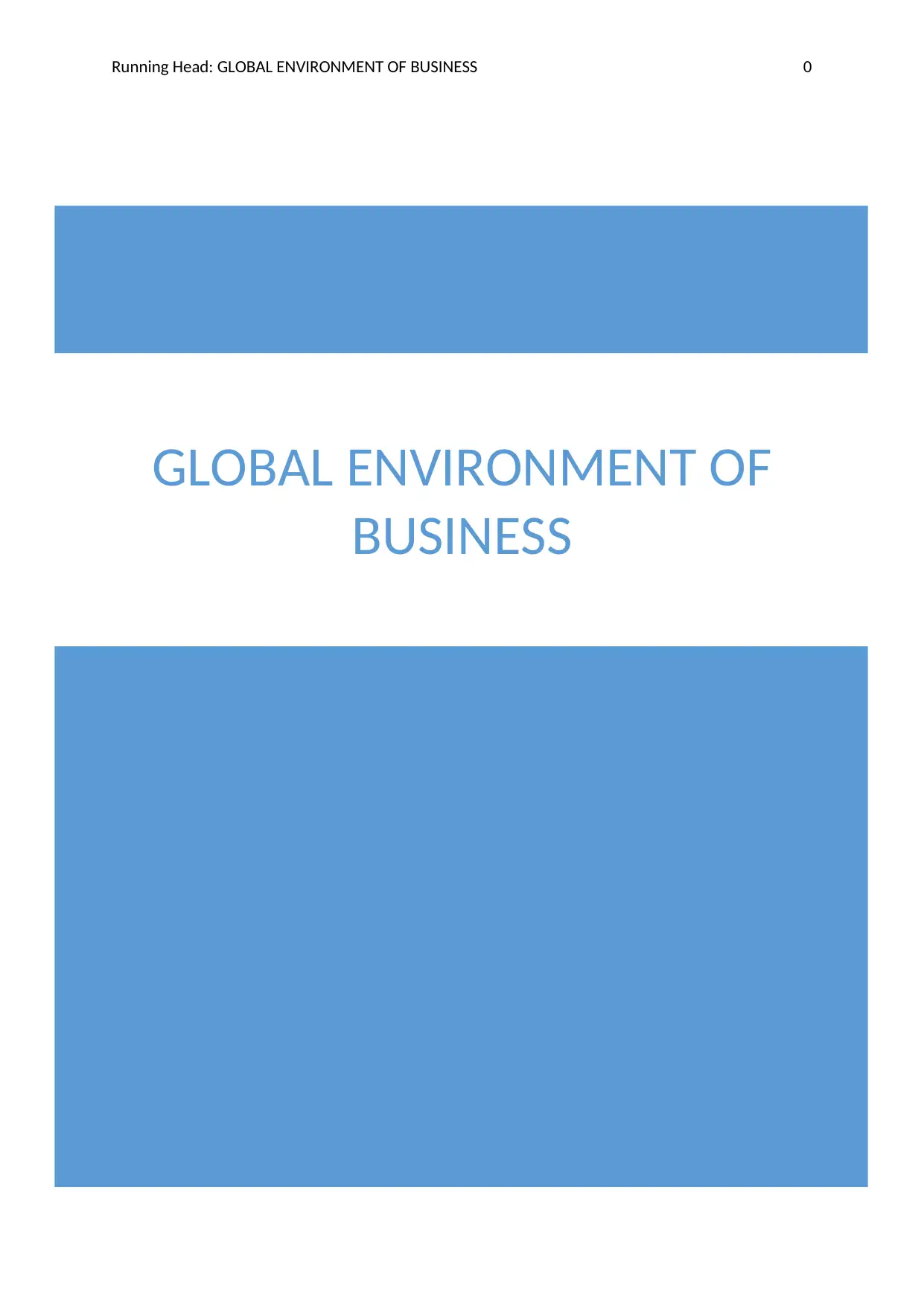
GLOBAL ENVIRONMENT OF
BUSINESS
Running Head: GLOBAL ENVIRONMENT OF BUSINESS 0
BUSINESS
Running Head: GLOBAL ENVIRONMENT OF BUSINESS 0
Paraphrase This Document
Need a fresh take? Get an instant paraphrase of this document with our AI Paraphraser
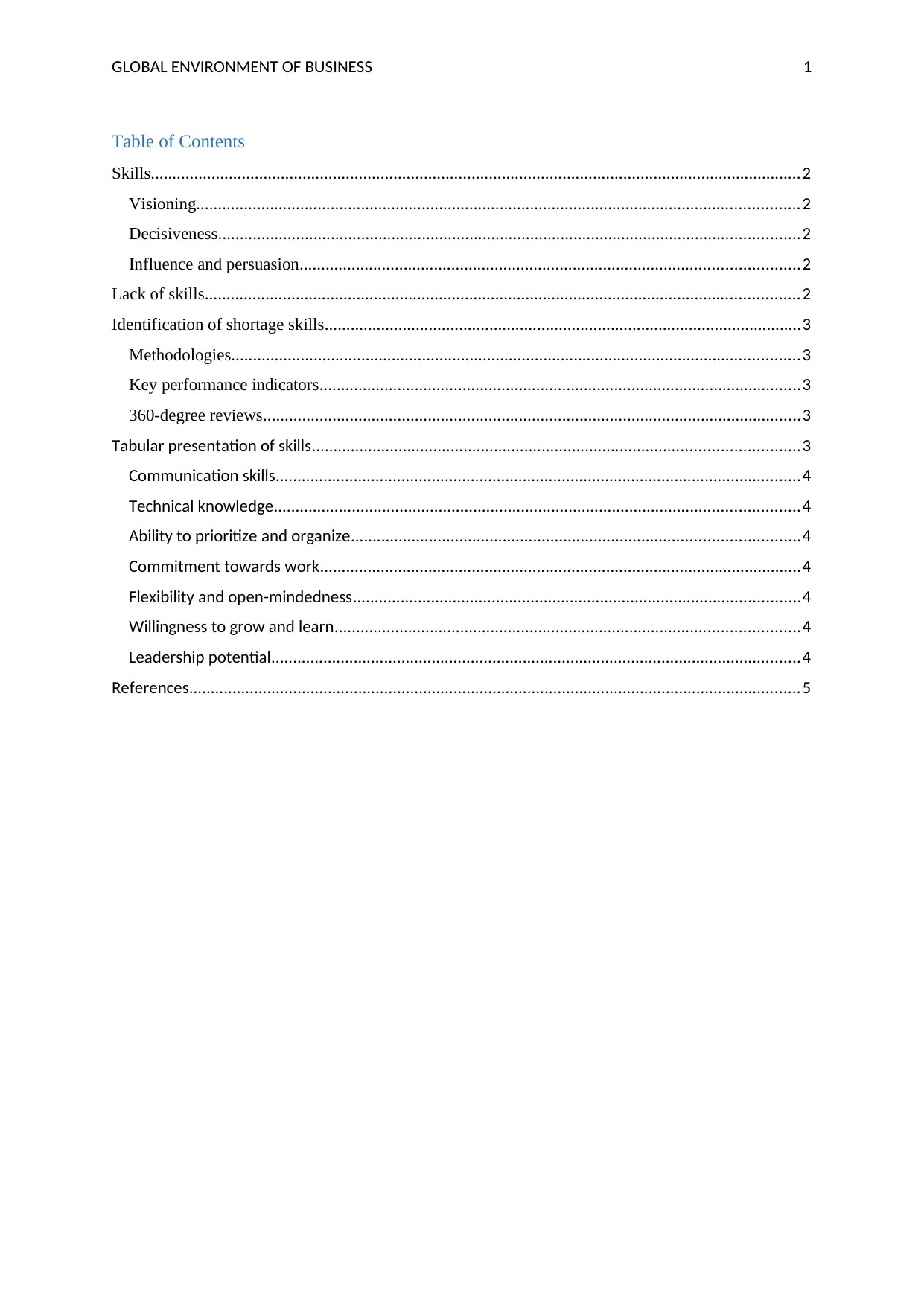
GLOBAL ENVIRONMENT OF BUSINESS 1
Table of Contents
Skills......................................................................................................................................................2
Visioning...........................................................................................................................................2
Decisiveness......................................................................................................................................2
Influence and persuasion...................................................................................................................2
Lack of skills.........................................................................................................................................2
Identification of shortage skills..............................................................................................................3
Methodologies...................................................................................................................................3
Key performance indicators...............................................................................................................3
360-degree reviews............................................................................................................................3
Tabular presentation of skills................................................................................................................3
Communication skills.........................................................................................................................4
Technical knowledge.........................................................................................................................4
Ability to prioritize and organize.......................................................................................................4
Commitment towards work...............................................................................................................4
Flexibility and open-mindedness.......................................................................................................4
Willingness to grow and learn...........................................................................................................4
Leadership potential..........................................................................................................................4
References.............................................................................................................................................5
Table of Contents
Skills......................................................................................................................................................2
Visioning...........................................................................................................................................2
Decisiveness......................................................................................................................................2
Influence and persuasion...................................................................................................................2
Lack of skills.........................................................................................................................................2
Identification of shortage skills..............................................................................................................3
Methodologies...................................................................................................................................3
Key performance indicators...............................................................................................................3
360-degree reviews............................................................................................................................3
Tabular presentation of skills................................................................................................................3
Communication skills.........................................................................................................................4
Technical knowledge.........................................................................................................................4
Ability to prioritize and organize.......................................................................................................4
Commitment towards work...............................................................................................................4
Flexibility and open-mindedness.......................................................................................................4
Willingness to grow and learn...........................................................................................................4
Leadership potential..........................................................................................................................4
References.............................................................................................................................................5
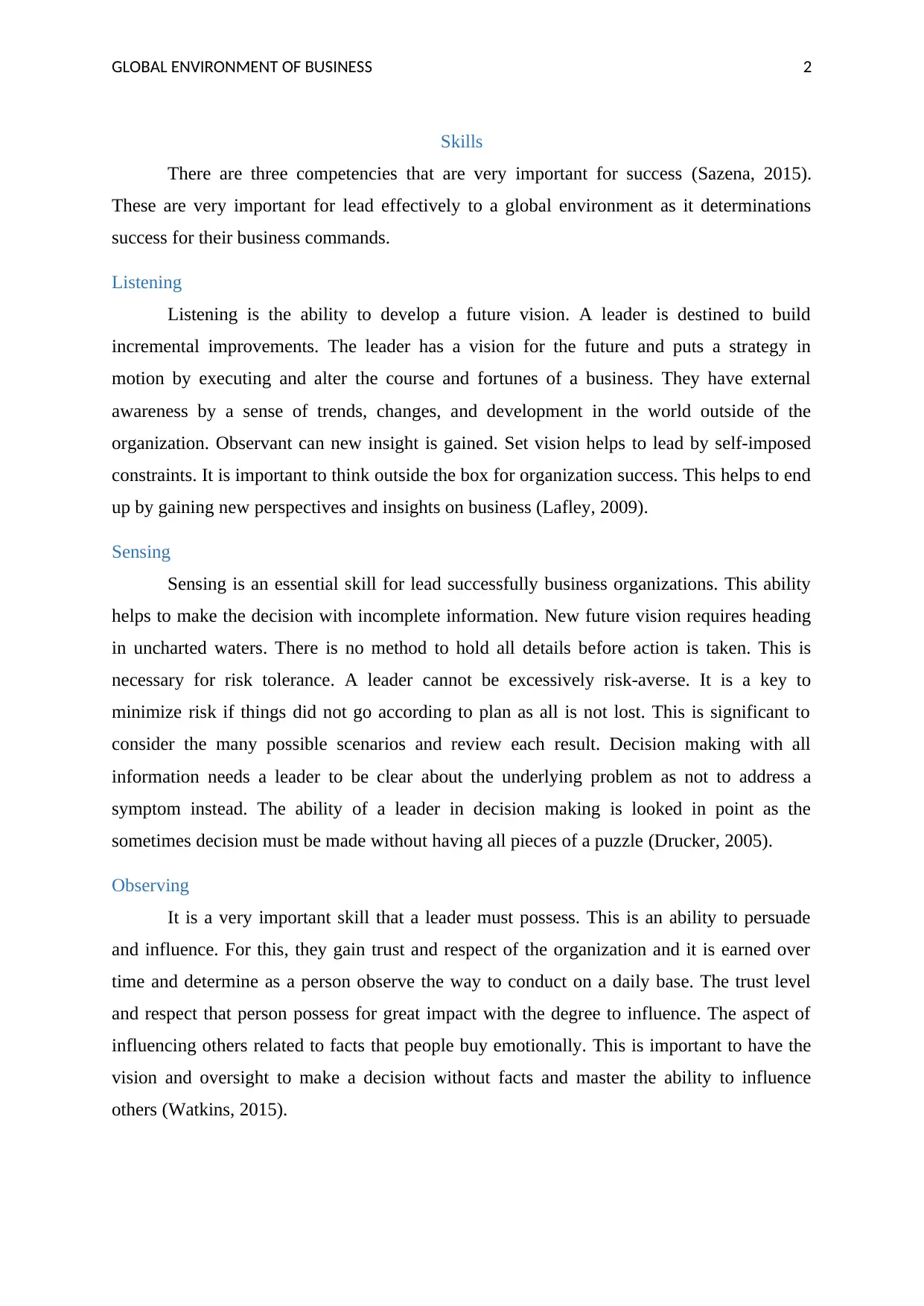
GLOBAL ENVIRONMENT OF BUSINESS 2
Skills
There are three competencies that are very important for success (Sazena, 2015).
These are very important for lead effectively to a global environment as it determinations
success for their business commands.
Listening
Listening is the ability to develop a future vision. A leader is destined to build
incremental improvements. The leader has a vision for the future and puts a strategy in
motion by executing and alter the course and fortunes of a business. They have external
awareness by a sense of trends, changes, and development in the world outside of the
organization. Observant can new insight is gained. Set vision helps to lead by self-imposed
constraints. It is important to think outside the box for organization success. This helps to end
up by gaining new perspectives and insights on business (Lafley, 2009).
Sensing
Sensing is an essential skill for lead successfully business organizations. This ability
helps to make the decision with incomplete information. New future vision requires heading
in uncharted waters. There is no method to hold all details before action is taken. This is
necessary for risk tolerance. A leader cannot be excessively risk-averse. It is a key to
minimize risk if things did not go according to plan as all is not lost. This is significant to
consider the many possible scenarios and review each result. Decision making with all
information needs a leader to be clear about the underlying problem as not to address a
symptom instead. The ability of a leader in decision making is looked in point as the
sometimes decision must be made without having all pieces of a puzzle (Drucker, 2005).
Observing
It is a very important skill that a leader must possess. This is an ability to persuade
and influence. For this, they gain trust and respect of the organization and it is earned over
time and determine as a person observe the way to conduct on a daily base. The trust level
and respect that person possess for great impact with the degree to influence. The aspect of
influencing others related to facts that people buy emotionally. This is important to have the
vision and oversight to make a decision without facts and master the ability to influence
others (Watkins, 2015).
Skills
There are three competencies that are very important for success (Sazena, 2015).
These are very important for lead effectively to a global environment as it determinations
success for their business commands.
Listening
Listening is the ability to develop a future vision. A leader is destined to build
incremental improvements. The leader has a vision for the future and puts a strategy in
motion by executing and alter the course and fortunes of a business. They have external
awareness by a sense of trends, changes, and development in the world outside of the
organization. Observant can new insight is gained. Set vision helps to lead by self-imposed
constraints. It is important to think outside the box for organization success. This helps to end
up by gaining new perspectives and insights on business (Lafley, 2009).
Sensing
Sensing is an essential skill for lead successfully business organizations. This ability
helps to make the decision with incomplete information. New future vision requires heading
in uncharted waters. There is no method to hold all details before action is taken. This is
necessary for risk tolerance. A leader cannot be excessively risk-averse. It is a key to
minimize risk if things did not go according to plan as all is not lost. This is significant to
consider the many possible scenarios and review each result. Decision making with all
information needs a leader to be clear about the underlying problem as not to address a
symptom instead. The ability of a leader in decision making is looked in point as the
sometimes decision must be made without having all pieces of a puzzle (Drucker, 2005).
Observing
It is a very important skill that a leader must possess. This is an ability to persuade
and influence. For this, they gain trust and respect of the organization and it is earned over
time and determine as a person observe the way to conduct on a daily base. The trust level
and respect that person possess for great impact with the degree to influence. The aspect of
influencing others related to facts that people buy emotionally. This is important to have the
vision and oversight to make a decision without facts and master the ability to influence
others (Watkins, 2015).
⊘ This is a preview!⊘
Do you want full access?
Subscribe today to unlock all pages.

Trusted by 1+ million students worldwide
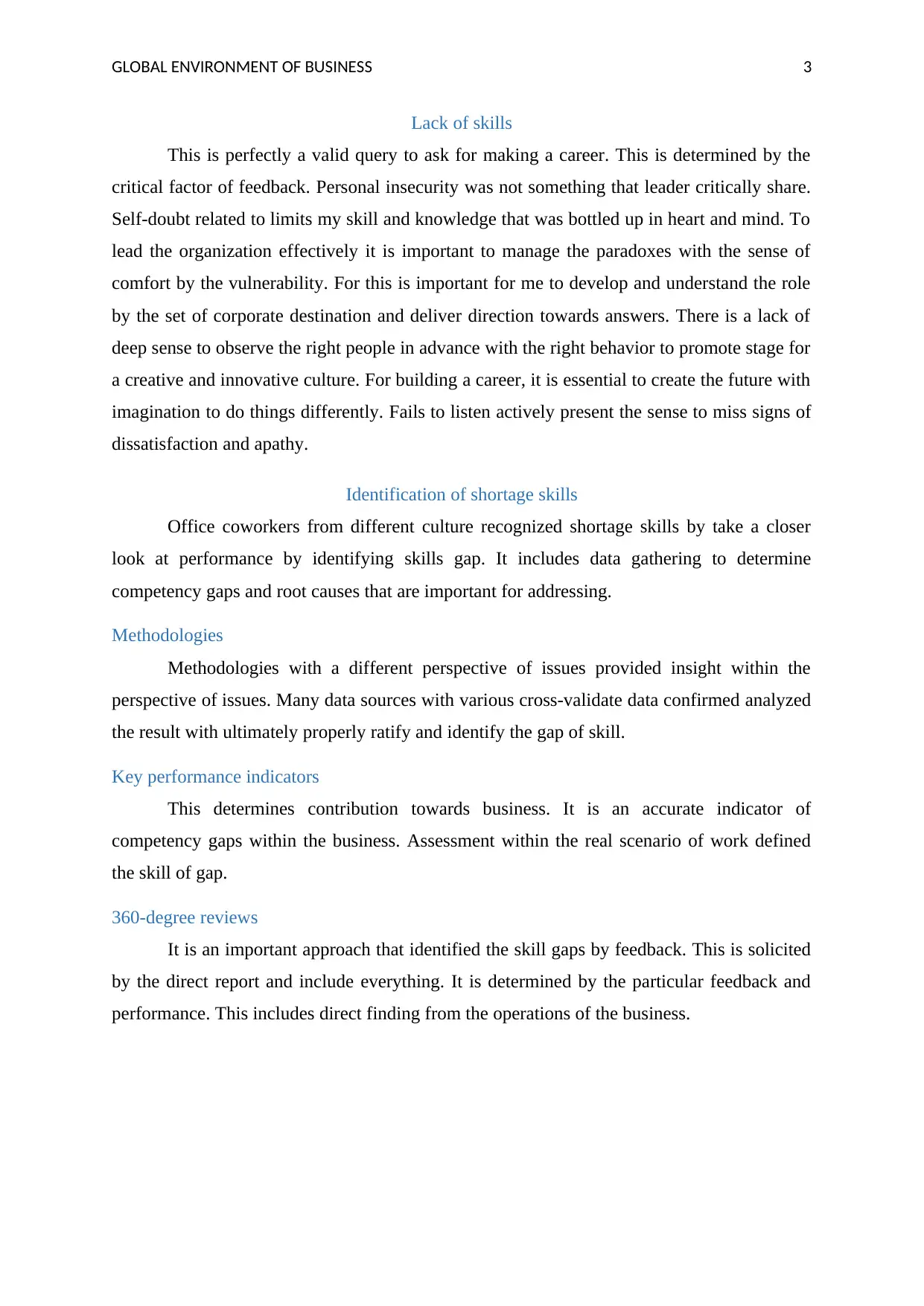
GLOBAL ENVIRONMENT OF BUSINESS 3
Lack of skills
This is perfectly a valid query to ask for making a career. This is determined by the
critical factor of feedback. Personal insecurity was not something that leader critically share.
Self-doubt related to limits my skill and knowledge that was bottled up in heart and mind. To
lead the organization effectively it is important to manage the paradoxes with the sense of
comfort by the vulnerability. For this is important for me to develop and understand the role
by the set of corporate destination and deliver direction towards answers. There is a lack of
deep sense to observe the right people in advance with the right behavior to promote stage for
a creative and innovative culture. For building a career, it is essential to create the future with
imagination to do things differently. Fails to listen actively present the sense to miss signs of
dissatisfaction and apathy.
Identification of shortage skills
Office coworkers from different culture recognized shortage skills by take a closer
look at performance by identifying skills gap. It includes data gathering to determine
competency gaps and root causes that are important for addressing.
Methodologies
Methodologies with a different perspective of issues provided insight within the
perspective of issues. Many data sources with various cross-validate data confirmed analyzed
the result with ultimately properly ratify and identify the gap of skill.
Key performance indicators
This determines contribution towards business. It is an accurate indicator of
competency gaps within the business. Assessment within the real scenario of work defined
the skill of gap.
360-degree reviews
It is an important approach that identified the skill gaps by feedback. This is solicited
by the direct report and include everything. It is determined by the particular feedback and
performance. This includes direct finding from the operations of the business.
Lack of skills
This is perfectly a valid query to ask for making a career. This is determined by the
critical factor of feedback. Personal insecurity was not something that leader critically share.
Self-doubt related to limits my skill and knowledge that was bottled up in heart and mind. To
lead the organization effectively it is important to manage the paradoxes with the sense of
comfort by the vulnerability. For this is important for me to develop and understand the role
by the set of corporate destination and deliver direction towards answers. There is a lack of
deep sense to observe the right people in advance with the right behavior to promote stage for
a creative and innovative culture. For building a career, it is essential to create the future with
imagination to do things differently. Fails to listen actively present the sense to miss signs of
dissatisfaction and apathy.
Identification of shortage skills
Office coworkers from different culture recognized shortage skills by take a closer
look at performance by identifying skills gap. It includes data gathering to determine
competency gaps and root causes that are important for addressing.
Methodologies
Methodologies with a different perspective of issues provided insight within the
perspective of issues. Many data sources with various cross-validate data confirmed analyzed
the result with ultimately properly ratify and identify the gap of skill.
Key performance indicators
This determines contribution towards business. It is an accurate indicator of
competency gaps within the business. Assessment within the real scenario of work defined
the skill of gap.
360-degree reviews
It is an important approach that identified the skill gaps by feedback. This is solicited
by the direct report and include everything. It is determined by the particular feedback and
performance. This includes direct finding from the operations of the business.
Paraphrase This Document
Need a fresh take? Get an instant paraphrase of this document with our AI Paraphraser
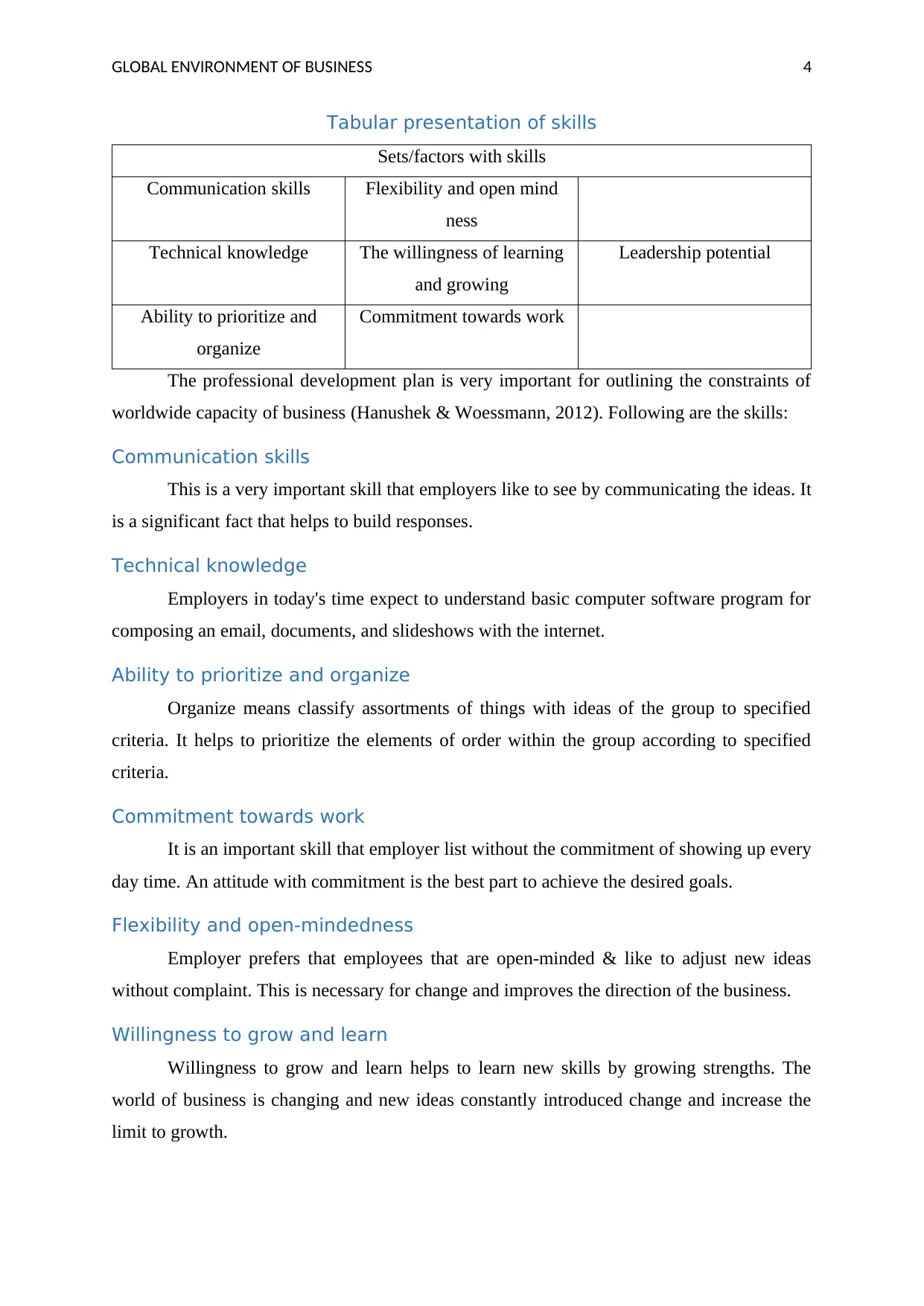
GLOBAL ENVIRONMENT OF BUSINESS 4
Tabular presentation of skills
Sets/factors with skills
Communication skills Flexibility and open mind
ness
Technical knowledge The willingness of learning
and growing
Leadership potential
Ability to prioritize and
organize
Commitment towards work
The professional development plan is very important for outlining the constraints of
worldwide capacity of business (Hanushek & Woessmann, 2012). Following are the skills:
Communication skills
This is a very important skill that employers like to see by communicating the ideas. It
is a significant fact that helps to build responses.
Technical knowledge
Employers in today's time expect to understand basic computer software program for
composing an email, documents, and slideshows with the internet.
Ability to prioritize and organize
Organize means classify assortments of things with ideas of the group to specified
criteria. It helps to prioritize the elements of order within the group according to specified
criteria.
Commitment towards work
It is an important skill that employer list without the commitment of showing up every
day time. An attitude with commitment is the best part to achieve the desired goals.
Flexibility and open-mindedness
Employer prefers that employees that are open-minded & like to adjust new ideas
without complaint. This is necessary for change and improves the direction of the business.
Willingness to grow and learn
Willingness to grow and learn helps to learn new skills by growing strengths. The
world of business is changing and new ideas constantly introduced change and increase the
limit to growth.
Tabular presentation of skills
Sets/factors with skills
Communication skills Flexibility and open mind
ness
Technical knowledge The willingness of learning
and growing
Leadership potential
Ability to prioritize and
organize
Commitment towards work
The professional development plan is very important for outlining the constraints of
worldwide capacity of business (Hanushek & Woessmann, 2012). Following are the skills:
Communication skills
This is a very important skill that employers like to see by communicating the ideas. It
is a significant fact that helps to build responses.
Technical knowledge
Employers in today's time expect to understand basic computer software program for
composing an email, documents, and slideshows with the internet.
Ability to prioritize and organize
Organize means classify assortments of things with ideas of the group to specified
criteria. It helps to prioritize the elements of order within the group according to specified
criteria.
Commitment towards work
It is an important skill that employer list without the commitment of showing up every
day time. An attitude with commitment is the best part to achieve the desired goals.
Flexibility and open-mindedness
Employer prefers that employees that are open-minded & like to adjust new ideas
without complaint. This is necessary for change and improves the direction of the business.
Willingness to grow and learn
Willingness to grow and learn helps to learn new skills by growing strengths. The
world of business is changing and new ideas constantly introduced change and increase the
limit to growth.
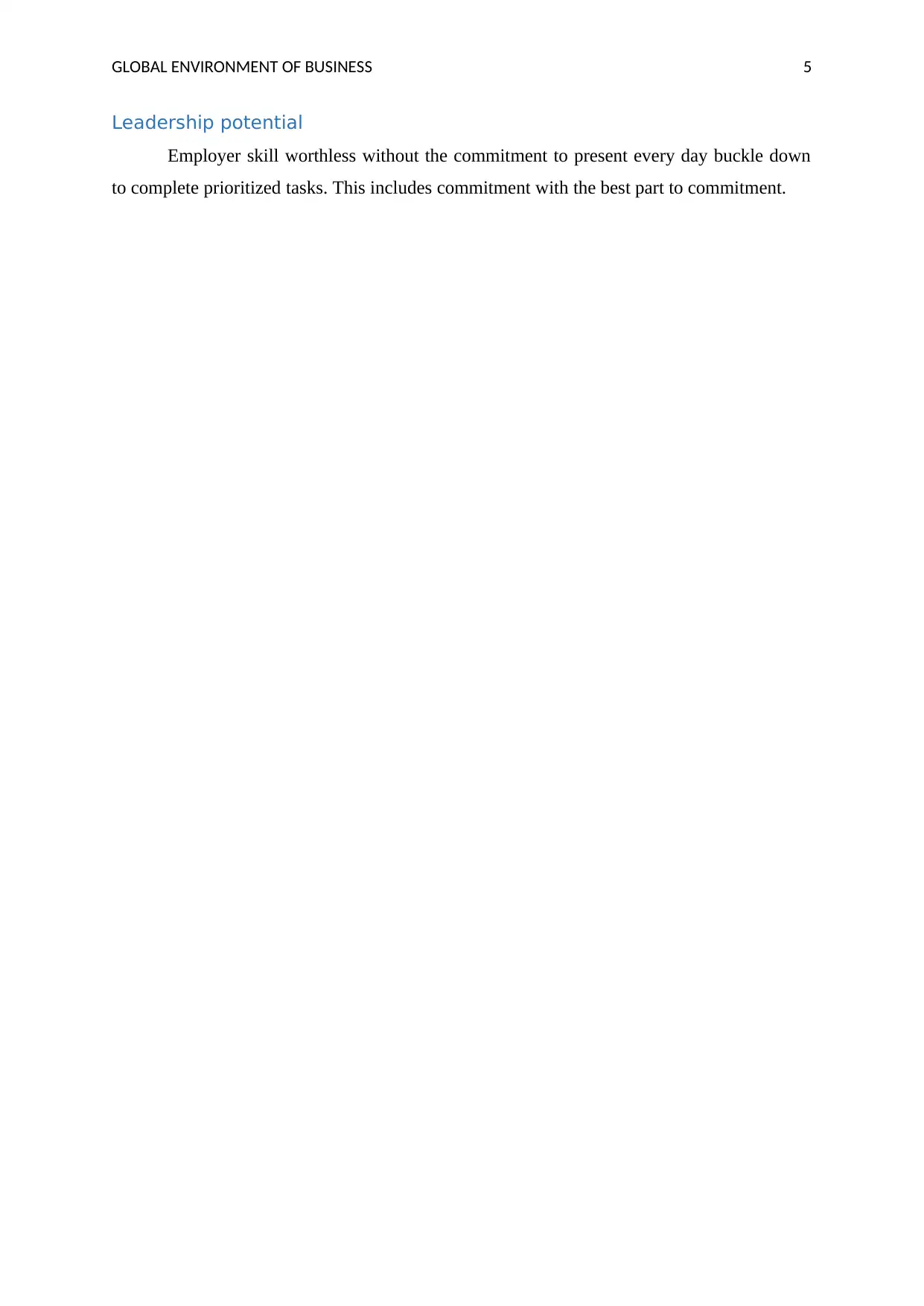
GLOBAL ENVIRONMENT OF BUSINESS 5
Leadership potential
Employer skill worthless without the commitment to present every day buckle down
to complete prioritized tasks. This includes commitment with the best part to commitment.
Leadership potential
Employer skill worthless without the commitment to present every day buckle down
to complete prioritized tasks. This includes commitment with the best part to commitment.
⊘ This is a preview!⊘
Do you want full access?
Subscribe today to unlock all pages.

Trusted by 1+ million students worldwide
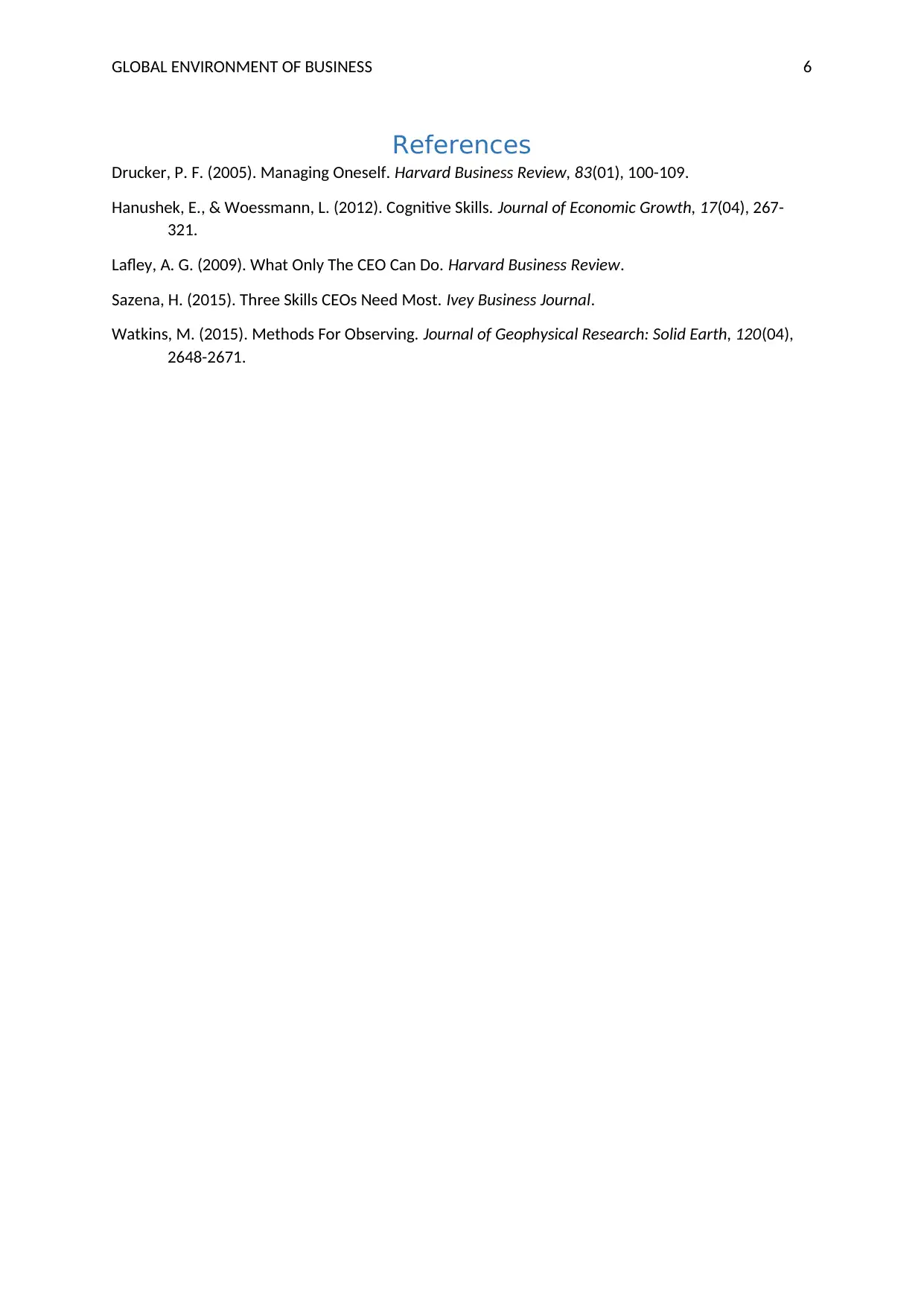
GLOBAL ENVIRONMENT OF BUSINESS 6
References
Drucker, P. F. (2005). Managing Oneself. Harvard Business Review, 83(01), 100-109.
Hanushek, E., & Woessmann, L. (2012). Cognitive Skills. Journal of Economic Growth, 17(04), 267-
321.
Lafley, A. G. (2009). What Only The CEO Can Do. Harvard Business Review.
Sazena, H. (2015). Three Skills CEOs Need Most. Ivey Business Journal.
Watkins, M. (2015). Methods For Observing. Journal of Geophysical Research: Solid Earth, 120(04),
2648-2671.
References
Drucker, P. F. (2005). Managing Oneself. Harvard Business Review, 83(01), 100-109.
Hanushek, E., & Woessmann, L. (2012). Cognitive Skills. Journal of Economic Growth, 17(04), 267-
321.
Lafley, A. G. (2009). What Only The CEO Can Do. Harvard Business Review.
Sazena, H. (2015). Three Skills CEOs Need Most. Ivey Business Journal.
Watkins, M. (2015). Methods For Observing. Journal of Geophysical Research: Solid Earth, 120(04),
2648-2671.
1 out of 7
Related Documents
Your All-in-One AI-Powered Toolkit for Academic Success.
+13062052269
info@desklib.com
Available 24*7 on WhatsApp / Email
![[object Object]](/_next/static/media/star-bottom.7253800d.svg)
Unlock your academic potential
Copyright © 2020–2025 A2Z Services. All Rights Reserved. Developed and managed by ZUCOL.



